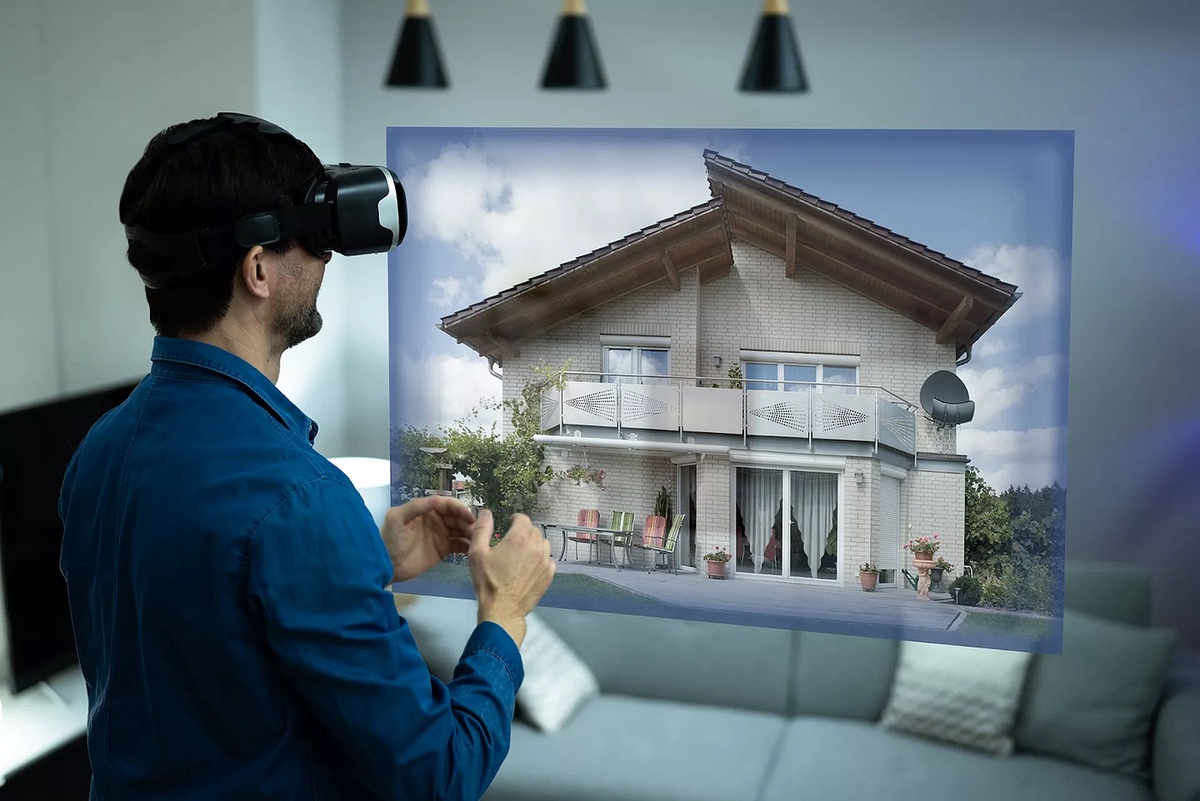Virtual Reality (VR) has progressed enormously, reshaping industries worldwide. One field where VR finds diverse applications is real estate. It's transforming property viewings, enabling global investments seamlessly. Here, we'll explore how VR is utilized in real estate and its impact.
Immersive Property Viewings through VR Tours
Traditional property viewings are evolving with Virtual Reality (VR) tours providing an innovative alternative. By wearing a VR headset, prospective buyers can explore properties remotely, navigating rooms effortlessly. This immersive experience allows visualizing layouts, dimensions and aesthetics intimately without physical visits. The engaging nature forges stronger connections as buyers envision residing there. Moreover, VR accommodates distant buyers examining properties realistically like on-site visits, surpassing photos and videos. This technology elevates property presentations redefining property exploration standards digitally. It's revolutionizing real estate making viewings more accessible and efficient proving a game-changer.
Bringing Global Real Estate Within Reach
Virtual Reality (VR) tech revolutionizes global property investing. It empowers international buyers to virtually tour prospects from their homes. A powerful tool for exploring foreign real estate! No need for costly travel, VR captures every detail. Envision the property's ambience, spatial flow, neighborhood—without leaving your armchair. Streamlining due diligence boosts confidence in high-stakes investments. Investors gain intimate property familiarity to inform critical decisions. The immersive experience levels the playing field for accessing worldwide opportunities. VR democratizes international real estate investing. This transformation simplifies cross-border transactions, fostering greater global diversification.
Good To Read:- Using Virtual Reality In Real Estate: Its Purpose, Benefits and Use Cases
Architects' VR Vision Board Enhances Project Execution
Virtual reality reimagines architectural workflows, from concept to construction. Designers use interactive and 3D models to visualize structures prebuilding. Collaborators analyze spatial relationships, lighting, and materials—spotting issues early. The immersive experience translates designs into user perspectives. VR pre-visualization identifies flaws upfront, averting costly overruns. It powers sand eamless team communication by aligning stakeholder expectations. Architects, developers, and clients shareand the VR vision. This collaborative approach optimizes workflows like never before. Projects stay on schedule, and finish on budget. VR ensures outputs match initial plans flawlessly. As the technology advances, VR will solidify its role in transforming how buildings come to life.
Virtual Staging and Its Impact on Home Sales
Virtual staging is an advanced VR application revolutionizing residential property transactions. It enhances vacant rooms with digital furnishings and decor, bringing properties visually alive and highly attractive for buyers. This creative technique helps purchasers envision a space's possibilities beyond bare walls. Virtual staging's advantages far surpass aesthetics; it's a powerful sales driver. Digitally staged properties generate more interest, leading to quicker sales and often higher prices versus unstaged counterparts. This edge excels in competitive marketplaces requiring standout listings. Virtual staging circumvents logistical hassles and steep costs of traditional staging, offering cost-effective flexibility. Realtors can curate stylistic looks tailored to target demographics, maximizing buyer appeal. This modern method streamlines selling while optimally showcasing properties regardless of current condition.
Must Read:- Top Software Development Companies in India for 2024
Real Estate Training and Education Through VR
Virtual Reality emerges as a potent educational tool amid real estate's rapid evolution. VR immerses professionals like agents and brokers in realistic, interactive simulations replicating countless real-world scenarios. These virtual training programs hone negotiation skills, property presentation techniques, and in-depth market knowledge dynamically and engagingly. Beyond career development, VR educates clients about real estate transactions' intricacies.
Buyers and sellers gain valuable insights through interactive VR experiences covering stages like buying/selling properties, mortgage processes, etc., demystifying real estate's complexities for the public. This innovative learning approach accelerates mastering key concepts while enriching clients' market understanding, fostering more informed, confident consumers. As the industry embraces digital transformation, VR training's role represents a transformative advancement, unmatched in immersion and interactivity versus traditional methods.
Future Possibilities: Virtual Reality Transformations in Real Estate
Virtual reality tech keeps evolving, opening new pathways within real estate. As VR interfaces become smoother, easier, adoption will rise rapidly. This sparks big shifts in marketing properties, making deals, planning construction. What's next? Ultra-lifelike virtual tours, allowing buyers to remodel properties digitally - tailoring homes as desired before deciding. Wow! Augmented reality (AR), VR's close cousin, might mesh with VR. Create supremely immersive digital landscapes by projecting vivid virtual home setups onto physical spaces using devices.
VR has huge potential too for city planning, mapping impacts from new districts - viewing digital urban models predicting effects on traffic flow, environments, residential communities. Like never before! Blending AI with VR could yield personalized property listings, recommended based on user behaviors. Talk about streamlining home searches. As VR combines with other futuristic innovations, the property world braces for a digital upheaval, promising unprecedented interactivity and efficiency across realty.
Are you considering adding virtual commerce features to your property application? Discover industry-leading Best Real Estate Software Solutions with advanced, future-proof functionalities at Hidden Brains.
Wrapping up
Virtual reality makes a big impact on real estate. This tech change how people view properties, invest, and plan new buildings. VR lets buyers tour homes, stage rooms virtually, and train workers in realistic settings. This makes things more engaging, efficient, and dynamic than before. VR isn't just new machinery - realtors use it to boost value, decision-making, and customers' experiences.
Looking ahead, VR has lots more potential in real estate. Better realism, interactivity, and combo with other tech will transform buying, selling, and developing property further. Digital changes enabled by VR make real estate more inclusive, accessible, and customizable for everyone involved. VR's journey is beginning, and increasing use/improvement will usher in a new era for the industry.


No comments yet